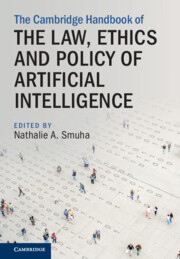Acknowledgments
The idea for this edited book first arose in the margin of the first edition of the KU Leuven Summer School on the Law, Ethics and Policy of Artificial Intelligence, which I organized in the summer of 2021. Since then, the course has taken place every year, bringing together people from various countries and disciplinary backgrounds to the small town of Leuven. When designing the program, I asked myself which type of course I would have loved to follow as a student, which made it evident from the get-go that the curriculum should be both interdisciplinary and comprehensive in providing an overview of AI’s societal implications. Very soon, I was asked if there was a possibility to disseminate the content of the course more broadly as the demand to participate far exceeded the capacity, which led to the start of this open-source project.
A number of people were instrumental in making the Summer School (and hence this book) happen and are thus the first I wish to thank. Sara Van Steyvoort has been the best organizational assistant one could have wished for, in addition to being a fantastic colleague. Sofia Devroe took up the role of academic assistant during the Summer School’s first edition, followed by Victoria Hendrickx who brilliantly took up the torch for the subsequent editions. Both of them were an absolute pleasure to work with, and their dedication, kindness, and wit have contributed immensely to the Summer School’s success. None of this would have happened without Geert Van Calster, my then doctoral supervisor, who encouraged me to take up this slightly daunting task. In addition, I owe thanks to KU Leuven for enabling me to organize the Summer School, and to the many colleagues at the Faculty of Law, the Institute for AI, and elsewhere who supported this endeavor.
Next, I would like to thank all the authors who have contributed a chapter to this book, namely – in order of appearance – Wannes Meert, Tinne De Laet, Luc De Raedt, Vincent C. Müller, Stefan Buijsman, Michael Klenk, Jeroen van den Hoven, Laurens Naudts, Anton Vedder, Lode Lauwaert, Ann-Katrien Oimann, Gry Hasselbalch, Aimee Van Wynsberghe, Pierre Dewitte, Jan De Bruyne, Wannes Ooms, Friso Bostoen, Evelyne Terryn, Sylvia Martos Marquez, Jozefien Vanherpe, Karen Yeung, Inge Molenaar, Duuk Baten, Imre Bárd, Marthe Stevens, Lidia Dutkiewicz, Noémie Krack, Aleksandra Kuczerawy, Peggy Valcke, Griet Verhenneman, Katja Langenbucher, Aída Ponce Del Castillo, Simon Taes, Rosamunde Van Brakel, and Katerina Yordanova. Most of them have also been guest lecturers at the Summer School, often for multiple years, and have consolidated the content of their lectures in their contributions. I am very grateful for their time and effort, and for the insights they have shared.
Most important of all, I wish to thank all the alumni of the AI Summer School, to whom this book is dedicated. When starting this program, I could never have imagined what an absolutely wonderful community it would become, full of intellectual curiosity, kindhearted generosity, and thoughtful support. Getting to know them has given me the best possible reason to be hopeful – amidst and despite the many concerns AI poses – that a brighter future is nevertheless achievable when individuals across countries and disciplines join forces to work on it together.

